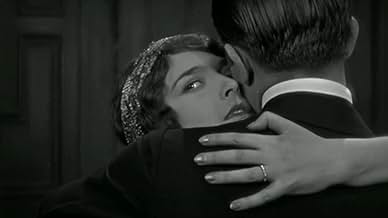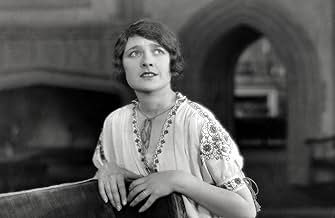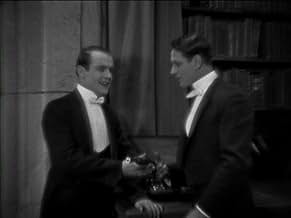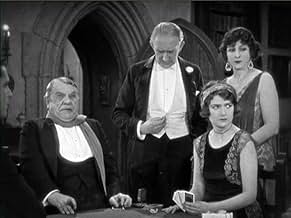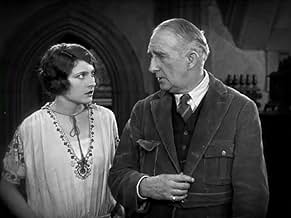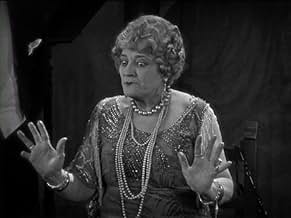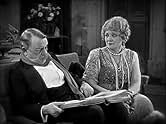Una joven esposa deja a su esposo e hijo pequeño por su amante, 30 años después la historia parece que se va a repetir en la misma casa.Una joven esposa deja a su esposo e hijo pequeño por su amante, 30 años después la historia parece que se va a repetir en la misma casa.Una joven esposa deja a su esposo e hijo pequeño por su amante, 30 años después la historia parece que se va a repetir en la misma casa.
- Dirección
- Guión
- Reparto principal
Reseñas destacadas
THE CIRLCE is a charming little film, full of humor and ironies.
Based on a play by Somerset Maugham, THE CIRCLE is a handsome film directed by Frank Borzage. The film opens in the 1890s as Lady Catherine is about to leave her husband (and son) and run off with her lover. The scene dissolves to 30 years later where young Elizabeth (pretty Eleanor Boardman) is facing the same decision: dull husband (Creighton Hale) or dashing lover (Malcolm McGregor). To make matters worse, Lady Catherine has been invited (along with husband) to visit! As Boardman and company get ready for their guests we get several shots of Lady Catherine and husband motoring toward the country estate. The shots are from the back. So it's a slight shock when Lady Catherine breezes into the house and goes up to McGregor, thinking he's her son. Lady Catherine (superbly played by Eugenie Besserer) is seen to be a rather silly middle-aged dowager wearing too much makeup.
As the story progresses, Boardman starts to learn a lesson in romantic folly from the fading older woman who constantly gazes at an old photograph of herself (it's actually a photo of 20-year-old Joan Crawford who also plays the young Lady Catherine one of about a half dozen films she appeared in in 1925).
Co-stars include Alec B. Francis, George Fawcett, and Eulalie Jensen.
Based on a play by Somerset Maugham, THE CIRCLE is a handsome film directed by Frank Borzage. The film opens in the 1890s as Lady Catherine is about to leave her husband (and son) and run off with her lover. The scene dissolves to 30 years later where young Elizabeth (pretty Eleanor Boardman) is facing the same decision: dull husband (Creighton Hale) or dashing lover (Malcolm McGregor). To make matters worse, Lady Catherine has been invited (along with husband) to visit! As Boardman and company get ready for their guests we get several shots of Lady Catherine and husband motoring toward the country estate. The shots are from the back. So it's a slight shock when Lady Catherine breezes into the house and goes up to McGregor, thinking he's her son. Lady Catherine (superbly played by Eugenie Besserer) is seen to be a rather silly middle-aged dowager wearing too much makeup.
As the story progresses, Boardman starts to learn a lesson in romantic folly from the fading older woman who constantly gazes at an old photograph of herself (it's actually a photo of 20-year-old Joan Crawford who also plays the young Lady Catherine one of about a half dozen films she appeared in in 1925).
Co-stars include Alec B. Francis, George Fawcett, and Eulalie Jensen.
This is a very good silent film that tests out the old expression "Like father, like son".
When the film begins, Clive doesn't realize that his beloved wife, Catherine, is cheating on him. She unexpectedly runs away with Clive's best friend...leaving Clive and her young son to fend for themselves.
Thirty years pass. The son, Arnold, has married Elizabeth and while he doesn't realize it, trouble is brewing...similar to his parents. Elizabeth has invited Arnold's mother and step-father to their estate. But her reasons suck...she wants to find out how well things went for them following their affair. She has a romantic notion that the pair were deliriously happy...and she's contemplating running off with some young buckaroo herself. Fortunately, Clive is not supposed to be home during this meeting between mother and son--the first in 30 years. However, Clive DOES end up returning early and the reaction is NOT what everyone expected. He was very happy to see his wife and old friend...and harbors no bitterness! What about Arnold? Well, see the film and find out for yourself.
This is a very clever film that deals with adultery in a very grown up and realistic manner (at least in some ways). It also is very well written and acted...so if you think you'll hate silents, it's a good bet this one will keep you entertained.
When the film begins, Clive doesn't realize that his beloved wife, Catherine, is cheating on him. She unexpectedly runs away with Clive's best friend...leaving Clive and her young son to fend for themselves.
Thirty years pass. The son, Arnold, has married Elizabeth and while he doesn't realize it, trouble is brewing...similar to his parents. Elizabeth has invited Arnold's mother and step-father to their estate. But her reasons suck...she wants to find out how well things went for them following their affair. She has a romantic notion that the pair were deliriously happy...and she's contemplating running off with some young buckaroo herself. Fortunately, Clive is not supposed to be home during this meeting between mother and son--the first in 30 years. However, Clive DOES end up returning early and the reaction is NOT what everyone expected. He was very happy to see his wife and old friend...and harbors no bitterness! What about Arnold? Well, see the film and find out for yourself.
This is a very clever film that deals with adultery in a very grown up and realistic manner (at least in some ways). It also is very well written and acted...so if you think you'll hate silents, it's a good bet this one will keep you entertained.
There's the gorgeous lady and her lover;there's the husband.One night ,she leaves him in a romantic manner...
But what follows happens thirty years after.And Frank Borzage tramples the golden principles underfoot .Gone is the old cliché,as old as the hills,of the romantic lovers.The beauty has become a sour-tempered pudgy old lady while the dashing attentive escort has grown into a grumpy sullen less-than-attractive greybeard.And finally it's the cheated husband who walks out with the honors:he has kept his dignity and he will do everything to spare his son the same fate as his.The characters,mainly in the card games sequence,are vividly depicted.
But what follows happens thirty years after.And Frank Borzage tramples the golden principles underfoot .Gone is the old cliché,as old as the hills,of the romantic lovers.The beauty has become a sour-tempered pudgy old lady while the dashing attentive escort has grown into a grumpy sullen less-than-attractive greybeard.And finally it's the cheated husband who walks out with the honors:he has kept his dignity and he will do everything to spare his son the same fate as his.The characters,mainly in the card games sequence,are vividly depicted.
The Circle by Somerset Maugham is one of those dated stories of adultery among the upper classes of England where no one behaves much like a recognizable human being (see Maugham's charming and more satisfying The Constant Wife). This stage to screen adaptation succeeds more than expected, largely because of intelligent direction by Frank Borzage and a great performance by supporting player Eugenie Besserer. Lead actress Eleanor Boardman is a beauty but at a disadvantage in a story that cannot take advantage of her naturalistic style. The real reason to see this movie is the terrific performance of Eugene Besserer as Lady Catherine, who ran away from her marriage 30 years before and is only now being reunited with her adult son (her younger self is played, fleetingly, by Joan Crawford). Brought back to the estate to see if "forbidden love" can endure, she sails back in as an aging flapper in a bountiful blonde wig. A confrontation with a photo of her younger self gives her the oppotunity for a bit of pathos, which she exploits beautifully. Besserer would earn a place in history a few years later as Al Jolson's mother in the groundbreaking sound film, The Jazz Singer, in which Jolson improvised the first dialogue heard in film in a scene with her.
The Circle manages some nifty physical comedy, such as the scene where the concerned family is steathily trying to separate their father from his shotgun. Many a scene like this depends on the style of the play -- stiff upper lip and so forth -- so modern audiences may be a bit puzzled. And even more puzzled by Boardman's character loving her man because he threatens to punch her in the eye.
Shortly after, Lucille received more face time in the late September 1925 Frank Borzage-directed "The Circle." She's the young wife in the film's prologue who leaves her husband and son, Arnold, for a lover as the two scamper away on a horse and buggy. Fast forward thirty years. Arnold (Creighton Hale) has a wife (Eleanor Boardman) who faces a similar situation in that she's about to run away with her lover. Before she does, she wants to see how Arnold's mother and lover, now husband, are faring after all those years. She invites them over to the house, but unfortunately for Lucille, another older actress (Eugenie Besserer) takes her place in the reunion.
LeSuer's role in "The Circle" was uncredited. But the part was substantial enough that the MGM publicity head saw she had a future in film and definitely needed a new name: LeSuer sounded too similar to a sewer. A contest in the Movie Weekly publication to rename the actress resulted in the winning entry "Joan Arden." Since there was another movie actress, Joan Arden, the poll's second place surname was "Crawford." She detested that since it reminded her of sounding like a crawfish. But she bowed to MGM's wishes. Joan Crawford then went on a personal campaign to secure larger roles, winning several dance contests and hobnobbing with influential studio personnel.
LeSuer's role in "The Circle" was uncredited. But the part was substantial enough that the MGM publicity head saw she had a future in film and definitely needed a new name: LeSuer sounded too similar to a sewer. A contest in the Movie Weekly publication to rename the actress resulted in the winning entry "Joan Arden." Since there was another movie actress, Joan Arden, the poll's second place surname was "Crawford." She detested that since it reminded her of sounding like a crawfish. But she bowed to MGM's wishes. Joan Crawford then went on a personal campaign to secure larger roles, winning several dance contests and hobnobbing with influential studio personnel.
¿Sabías que...?
- CuriosidadesNotable as the first film to feature Joan Crawford billed under her newly-christened screen name, selected from the winning entry in a Photoplay magazine contest.
- Citas
Opening Title Card: IT is the intention to herein point out that old, yet so valuable, moral - - "MAN MAY SELECT A WIFE - BUT HE SHOULD BE CAREFUL WHOSE WIFE HE SELECTS!"
- ConexionesVersion of Strictly Unconventional (1930)
Selecciones populares
Inicia sesión para calificar y añadir a tu lista para recibir recomendaciones personalizadas
Detalles
- Duración1 hora 11 minutos
- Color
- Mezcla de sonido
- Relación de aspecto
- 1.33 : 1
Contribuir a esta página
Sugerir un cambio o añadir el contenido que falta

